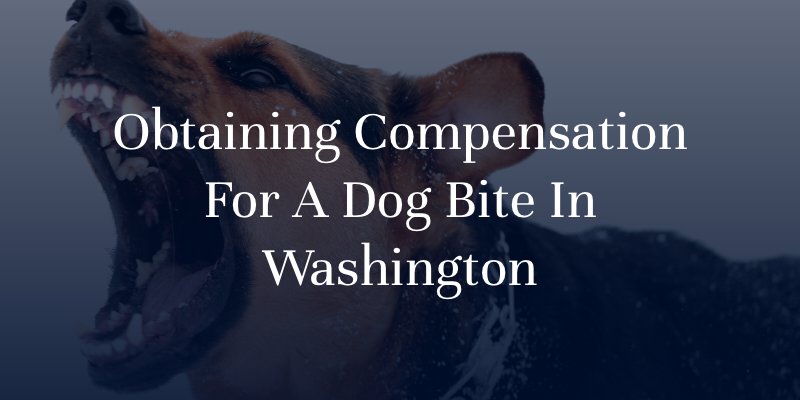Washington State Dog Laws (2024)
Every state has unique laws regarding pet ownership, dog bites, and animal attacks. Most states have statutes in place permitting dog bite victims to file claims seeking financial recovery from pet owners. Washington’s main dog bite statute is in Section 16.08.040 of the Revised Code of Washington. This law imposes strict liability on the owner of any dog that bites a person, regardless of any prior knowledge of viciousness or negligence on the owner’s part. If you have been injured or attacked by a dog, contact our Seattle dog bite lawyers today for a free consultation.
The One-Bite Rule versus Strict Liability for Dog Bites
In the United States, two primary legal doctrines govern dog bite cases: the one-bite rule and strict liability. Under the one-bite rule, a dog owner is only held liable for injuries caused by their dog if they have prior knowledge of the animal’s dangerous propensities. This means that the owner is essentially granted one free bite before they can be held responsible for any damages.
In contrast, under strict liability, a dog owner is held responsible for any injuries caused by their dog, regardless of whether they had prior knowledge of the animal’s aggressive behavior or whether the owner was negligent in any way. Many states follow a strict liability standard, granting broad protection to victims of these traumatic attacks.
When Can Victims File Claims Against Dog Owners?
In Washington, dog bite victims almost always have the right to file damages claims against the pet’s owner. It does not matter whether the owner knew or reasonably should have known of the dog’s vicious propensities, or whether the owner was negligent in controlling the animal. State law holds that the owner of any dog that bites a person, while the person is lawfully on the property, shall be strictly liable for damages.
The only exceptions are if the victim was trespassing at the time of the attack, or if the dog was a police dog carrying out its professional duties at the time of the incident. Damage claims can seek financial recovery for many different losses relating to the accident, including past and future medical expenses, lost income, property damages, and pain and suffering. Dog attacks can cause many physical and emotional damages a victim may have the right to recover through the civil justice system.
Who Is Considered a Dog’s Owner in Washington?
Washington follows a strict liability approach to dog bite cases, but the law’s definition of a dog’s owner is broader than one might expect. In Washington, an owner is not just the person who legally owns the dog, but also anyone who harbors, keeps, or controls the animal.
This means that a person who is temporarily caring for a dog, such as a pet sitter or a family member, can be held liable for any injuries the dog causes during that time. This expanded definition of ownership ensures that victims of dog bites have a better chance of receiving compensation for their injuries, even if the legal owner is not present at the time of the incident.
What Types of Injuries Are Covered Under Washington’s Strict Liability Law?
Washington’s strict liability law covers a wide range of injuries related to dog bites and attacks. These injuries are not limited to the physical wounds caused by the dog’s teeth; they also encompass any other injuries that may occur as a result of the incident.
Some examples of injuries covered under Washington’s strict liability law include:
- Permanent Scars: The dog’s teeth or claws may cause scarring or disfigurement, which can last for years and lead to psychological as well as physical complications.
- Broken Bones: Fractures may occur when a victim falls or is knocked down by a dog during an attack, particularly in cases involving large or powerful breeds.
- Infection: Bacterial infections may develop in the wounds caused by a dog bite, especially if the wounds are deep or not properly cleaned and treated.
- Emotional Trauma: Psychological distress, such as post-traumatic stress disorder (PTSD), anxiety, or fear of dogs, is a common consequence of being attacked by a dog.
Are There Any Exceptions to Strict Liability in Washington?
While Washington’s strict liability law is comprehensive, there are a few exceptions to the rule. In these situations, a dog owner may not be held liable for injuries caused by their animal:
- Provocation: If the victim provoked the dog, such as by teasing, tormenting, or abusing the animal, the owner may not be held responsible for the resulting injuries.
- Trespassing: If the victim was trespassing on private property at the time of the incident, they were not legally present in the area where the attack took place. Therefore, the owner would not be liable.
- Police Dogs: When a police dog bites someone while performing its duties under the direction of a law enforcement officer, the strict liability rule does not apply. However, if the attack was unlawful or involved excessive force or police brutality, the victim may be able to pursue a negligence-based lawsuit against the department.
Obtaining Compensation for a Dog Bite in Washington
Washington’s strict liability law makes it easier for dog bite victims to secure compensation compared to states that follow a one-bite rule. The one-bite rule states that a dog owner will only be liable for damages if the dog had bitten someone in the past, or otherwise shown signs of aggression. Strict liability law is also more favorable for victims than the negligence doctrine, which requires victims to prove that the owner was negligent in some way that contributed to the attack.
A dog bite victim in Washington must only prove that he or she was lawfully in a private place, or on public land, at the time of the dog attack. The victim must also prove that the defendant in question was the owner or person controlling the dog. Possible defenses to dog bite claims are that the plaintiff was trespassing when the dog attacked, or that the plaintiff instigated the bite by provoking the dog. A local Seattle personal injury attorney can help you navigate a dog bite claim.
Other Washington State Dog Laws
Washington’s dog bite statute is not the only state law pertaining to dog ownership and control. Different cities and counties have enacted their own dog-specific rules and regulations. One such law is the ability of a county to create dog control zones. Section 16.10.020 of state law gives county commissioners the ability to establish dog control zones in highly populated districts or areas. These zones can impose restrictions as to how people use the land, as well as mandatory pet control.
In Seattle, it is unlawful for a pet owner to allow a dog to run at large, or to run freely without a leash, except in designated off-leash zones. Dogs must always be under the control of owners in controlled zones. They must not chase or run after vehicles or bicycles, trespass upon private property, damage public property, or chase or harass other animals or humans. Breaking the rules of a dog control zone or city statute could result in fines and penalties against the owner, as well as possible impoundment of the animal.
All pet owners must keep up with vaccination requirements, dog control zones, hunting dog regulations, and dangerous dog laws.
How Washington Defines A Dangerous Dog
Washington has several laws relating to dangerous dog breeds. A dangerous dog is one that inflicts severe injury on a human being without provocation, whether on public or private property. This includes dogs that have killed a domestic animal without provocation while off the owner’s property. Additionally, if a dog has previously been identified as potentially dangerous due to injuring a human and, after the owner was notified, the dog again behaves aggressively towards humans, it fits within this category.
Owners in Washington may still keep dangerous dogs, but they must adhere to enclosure and control laws. Dangerous dogs must use muzzles and restraint chains when outside proper enclosures. Local authorities have the power to regulate dangerous dogs.
The state also recognizes the category of a potentially dangerous dog. This designation applies to dogs that, without provocation, bite a human or domestic animal on any property, or chase or approach someone in a menacing manner on streets, sidewalks, or public grounds. It also includes dogs known to have the propensity or tendency to attack unprovoked, threatening the safety of humans or domestic animals.
How Long Do You Have to File a Dog Bite Claim in Washington?
Washington law allows victims of dog bites or attacks three years from the date of the incident to file a claim. In certain circumstances, this period may be extended or shortened. However, one fact remains true: if you do not file your claim by the appropriate deadline, the court will most likely dismiss your case.
Washington Revised Code Title 4. Civil Procedure § 4.16.080.
The following actions shall be commenced within three years:
(2) An action for taking, detaining, or injuring personal property, including an action for the specific recovery thereof, or for any other injury to the person or rights of another not hereinafter enumerated.
To retain your right to compensation, it is important to contact an attorney as soon as possible after a dog bite. Your lawyer can help you identify your filing deadline and initiate your lawsuit before the statute of limitations expires.
Speak to a Seattle Dog Bite Lawyer Today
Although Washington is a strict liability state, dog bite claims can be more complex than they appear at first glance. The dog’s owner may accuse you of trespassing on their property, limiting their liability. You can struggle to accurately calculate your total damages, including future medical expenses and non-economic losses such as pain and suffering. Furthermore, dealing with insurance companies and navigating the lawsuit process can be stressful, especially while you are coping with a serious injury.
In these situations, seeking the help of a Seattle dog bite attorney is vital. Your lawyer can help you understand how Washington’s dog bite laws apply to your case, gather evidence of the owner’s liability, and advocate for the compensation that you deserve. This may include damages for medical expenses, lost wages, pain and suffering, and other related costs.
If you or a loved one has been the victim of a dog bite or attack, don’t wait to seek legal assistance. Having an attorney on your side can make a significant difference in your claim, helping you navigate the process with confidence. Contact a Washington dog bite lawyer today to learn more about your options and take the first step toward recovery and justice.

